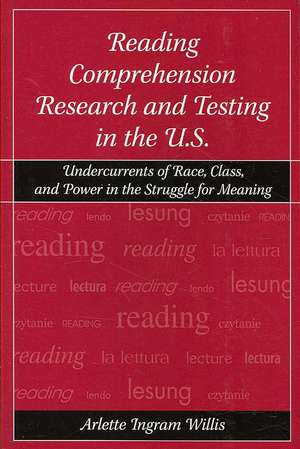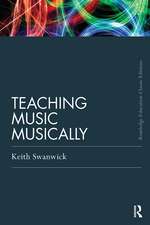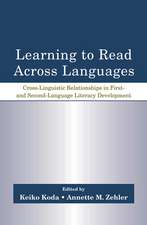Reading Comprehension Research and Testing in the U.S.: Undercurrents of Race, Class, and Power in the Struggle for Meaning
Autor Arlette Ingram Willisen Limba Engleză Paperback – 24 oct 2007
Reading Comprehension Research and Testing in the U.S. aims to revolutionize how reading comprehension is conceived, theorized, tested, and interpreted for all children. This is a critically relevant volume for educational researchers, teacher educators, school administrators, teachers, policy makers, and all those concerned with school literacy and educational equity.
Preț: 262.28 lei
Preț vechi: 350.28 lei
-25% Nou
Puncte Express: 393
Preț estimativ în valută:
50.18€ • 52.40$ • 41.44£
50.18€ • 52.40$ • 41.44£
Carte tipărită la comandă
Livrare economică 15-29 aprilie
Preluare comenzi: 021 569.72.76
Specificații
ISBN-13: 9780805850529
ISBN-10: 080585052X
Pagini: 406
Dimensiuni: 152 x 229 x 22 mm
Greutate: 0.57 kg
Ediția:1
Editura: Taylor & Francis
Colecția Routledge
Locul publicării:Oxford, United Kingdom
ISBN-10: 080585052X
Pagini: 406
Dimensiuni: 152 x 229 x 22 mm
Greutate: 0.57 kg
Ediția:1
Editura: Taylor & Francis
Colecția Routledge
Locul publicării:Oxford, United Kingdom
Public țintă
PostgraduateCuprins
Contents: Preface. Introduction. Western European Philosophical Foundations of Reading Comprehension Research and Testing. Ideological and Philosophical Foundations of Reading Comprehension Research and Testing. Reservoir of Themes and Premises: Social Influences of Early Concepts of Reading Comprehension. Producing Early Reading Comprehension Research and Testing. World War I and the Development of Reading Comprehension and Testing. Reproducing and Producing Reading Comprehension Research and Testing. Reading Comprehension Research and Testing Reinvents Itself. Federal Involvement in Reading Comprehension Research and Testing.
Recenzii
“Santayana was right: fields that don’t know their own history are forever destined to repeat it. In the case of reading, with recurrent cultural and social consequences, particularly for cultural minorities, we can’t reconstruct it without a theory of its history. That lesson comes through this volume loud and clear.”
—Allan Luke
Queensland University of Technology, Australia
“No practicing teacher should be without this book because it will help them understand their position in the field, the position of their students, the history that has positioned them as such, and the importance of considering ways to disrupt these positions.”
—Richard J. Meyer
University of New Mexico
"Willis’ argument is systematic, thorough and well documented…. [Her] purpose is clear. She outlines her goal of showing throughout the eight thoughtfully laid out chapters that racism, scientism, and classism are all components of western philosophical assumptions that underpin much of the research on reading comprehension and testing…. This book will be of interest to educators at all levels, but especially researchers in educational psychology, or assessment and achievement. It should be of particular interest to those who work in educational governance and a priority for anyone who is currently addressing differences in achievement based on race and class." --Margaret-Mary McGivern, Education Review, May 14, 2008
"Willis does an excellent job chronicling the history of the various Western educational philosophies from behaviorism, cognitive science, and constructivism, including how these philosophies have been used to develop reading curricula that fail to increase reading and comprehension rates among many learners…[This] is an important book for educators, scholars, designers of reading curricula, parents and politicians to understand how ideological history has not taught many American children to read and that a new perspective, pedagogy, and paradigm must be created to educate the future generations of American children."--Eric M. Bridges, PsycCritiques (April 2009), Vol. 54, No. 15
—Allan Luke
Queensland University of Technology, Australia
“No practicing teacher should be without this book because it will help them understand their position in the field, the position of their students, the history that has positioned them as such, and the importance of considering ways to disrupt these positions.”
—Richard J. Meyer
University of New Mexico
"Willis’ argument is systematic, thorough and well documented…. [Her] purpose is clear. She outlines her goal of showing throughout the eight thoughtfully laid out chapters that racism, scientism, and classism are all components of western philosophical assumptions that underpin much of the research on reading comprehension and testing…. This book will be of interest to educators at all levels, but especially researchers in educational psychology, or assessment and achievement. It should be of particular interest to those who work in educational governance and a priority for anyone who is currently addressing differences in achievement based on race and class." --Margaret-Mary McGivern, Education Review, May 14, 2008
"Willis does an excellent job chronicling the history of the various Western educational philosophies from behaviorism, cognitive science, and constructivism, including how these philosophies have been used to develop reading curricula that fail to increase reading and comprehension rates among many learners…[This] is an important book for educators, scholars, designers of reading curricula, parents and politicians to understand how ideological history has not taught many American children to read and that a new perspective, pedagogy, and paradigm must be created to educate the future generations of American children."--Eric M. Bridges, PsycCritiques (April 2009), Vol. 54, No. 15











